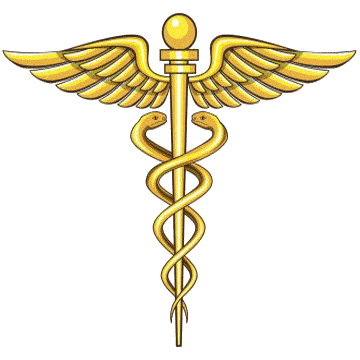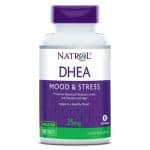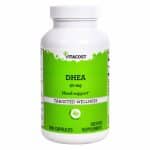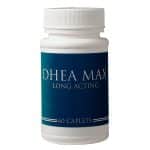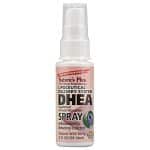DHEA has been shown to enhance the immune response against a wide range of pathogenic viruses, bacteria and parasites.
Clinical studies have reported that DHEA helps regulate the immune system and may play a role in the prevention and treatment of certain autoimmune diseases. It is suggested in many articles that DHEA is able to stimulate the immune system.
It is probably in the field of immunology that DHEA manifests the broadest spectrum of positive actions.
Clinical studies
In an animal study, treatment with DHEA supplementation showed a significant reduction in the number of internal parasites.
A recent study found a strong inversely proportional correlation between the level of DHEA-S and that of interleukin 6 (IL-6) in human serum. IL-6 is one of many cytokines, or immune cell “hormone-like” cells, that collectively regulate immune activity. High levels of interleukins are implicated as a causative factor in many diseases such as rheumatoid arthritis, osteoporosis, B cell cancer, atherosclerosis and Parkinson's disease. Interleukin 6 levels tend to increase significantly with age, unlike DHEA, which tends to decrease. After studying 120 healthy subjects between the ages of 15 and 75, RH Straub and colleagues concluded: "A declining serum DHEA concentration caused by aging or inflammatory disease is accompanied by an increased significant in the production of interleukin. Therefore, we come to the conclusion that the decrease in DHEA levels is a deleterious process, especially in chronic inflammatory diseases. »
O.Khorram, L.Vu and SSC Yen, long-time specialists in DHEA research, published an important study on it in 1997. Nine older (mean age 63) healthy men were prescribed 50 mg of DHEA daily for 20 weeks after taking a placebo for 2 weeks. The study demonstrated the stimulating effect of DHEA on the immune system of older men. DHEA rejuvenated the immune system by increasing secretion of IL-2, a potent T-cell growth factor, increasing the number of cells expressing the IL-2 receptor, and improving T-cell responsiveness to mitogenic stimulation . All of these processes decline during physiological aging. The significant increase in natural killer cell cytotoxicity in DHEA-treated subjects was potentially related to the increased number of killer cells, both events being induced by IL-2 stimulation by DHEA. No negative side effects were found when administering DHEA.
In a recent study (carried out double-blind with placebo) on 11 post-menopausal women, PR Casson and his colleagues administered to these people 50 mg of DHEA daily. They report that “the major finding of this study was the significant improvement in the activity of natural killer cells. This improvement was seen in all 11 subjects. In this study, DHEA appears to eliminate the unexplained increase in interleukin production seen in the placebo group. Natural killer cells are a key part of the immune system. They are (ideally) constantly in surveillance mode, especially seeking to destroy viruses and cancer cells.
Various abnormalities of the immune system have been described in the elderly. Among these has been reported the increased concentration of neopterin, which is produced by monocytes/macrophages upon stimulation with interferon-gamma. In order to examine the link between DHEA and neopterin in serum, a study was carried out on 281 healthy patients, who went to see their doctor for a check-up. 10% of them had an increased concentration of neopterin and 0.4% had an increased concentration of DHEA sulfate (DHEAs). The DHEA concentration was significantly higher in patients who had a lower neopterin concentration (Mann-Whitney test: U=4793, P<0.0001). There was therefore a strong inversely proportional correlation between the concentration of DHEAs and neopterin in the serum (Spearman's Correlation Rate: r(s)=-0.221, P<0.0001). The data support the thesis that the decline in DHEA due to aging is linked to the activation of the immune system.
